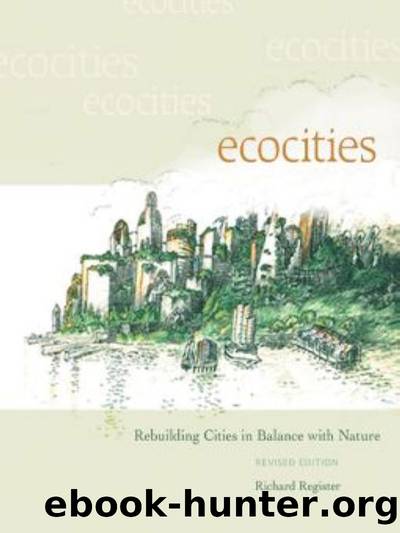EcoCities by Richard Register

Author:Richard Register
Language: eng
Format: epub
Publisher: New Society Publishers
Published: 2010-07-18T16:00:00+00:00
One can extract several major principles from Paolo Soleri’s and Ian McHarg’s work while architect Christopher Alexander of Berkeley, California, offers no fewer than 253 “patterns” in his book A Pattern Language, ranging from pleasing ways of arranging furniture and lighting to grand principles of arranging urban patterns on the largest scale, from tentatively recommended prescriptions to virtual holy commandments: Thou must build thus.
Struggling with all of this, I’ve come up with lists of about twenty to forty “principles,” but here I’ll just mention the few I think are most important:• Build the city like the living system it is. In other words, build it on a basically three-dimensional, integral, complex model, not flat, random, and in large areas uniform and simple. Like any living system, the city should be compact, and it should be designed primarily for a population of living things, mostly people, rather than for machines like cars or even buses. Its physical body and logistics must be based on the needs of flesh and blood, not steel and gasoline. It must be a pedestrian city. Paolo Soleri got it right about that shape and function — three-dimensional with well integrated complexity — and for doing virtually nothing to explore his discovery, we have been suffering more and more lost opportunities every day, for four decades. The “organic city” is a term some people are beginning to use, and so it must be.
• Make the city’s function fit with the patterns of evolution. Not only must it not destroy its sources of sustenance — i.e., be “sustainable” in the current language — but it must also regenerate natural systems and support and express creativity and compassion. As the universe evolves, its entities like stars and planets spawn beings like animals and plants, and some of these invent wings like those of insects, birds, and bats that never were before. And so people invent, among other things, Justice, Truth, Beauty, and the techniques of law, philosophy, and art to embody them. These and future inventions not yet imagined are what cities should support.
• Follow the builder’s sequence — start with the foundation. This means starting with a land use pattern that supports the healthy anatomy of the whole city. The land use/infrastructure — or “landustructure” as I sometimes call it — has to be ecologically tuned from the start, either the start of a new town or the start of reconceptualizing and remodeling an existing city. The ecocity map, which we will explore in some detail later, is the tool to get the foundation right.
• Reverse the transportation hierarchy. Transportation is so important in working with or against landuses and thus supporting or subverting practically everything else that could be healthy about cities that it is imperative to plan for pedestrians first, bicycles next, rail transit next, “flexible” transit (on-the-road busses) next, and lastly cars and trucks.
• Build soils and enhance biodiversity. This one is self-evident, but intimately connected with the above four. Beyond this, I support the
Download
This site does not store any files on its server. We only index and link to content provided by other sites. Please contact the content providers to delete copyright contents if any and email us, we'll remove relevant links or contents immediately.
Man-made Catastrophes and Risk Information Concealment by Dmitry Chernov & Didier Sornette(6019)
The Revenge of Geography: What the Map Tells Us About Coming Conflicts and the Battle Against Fate by Kaplan Robert D(4077)
Zero Waste Home by Bea Johnson(3838)
COSMOS by Carl Sagan(3623)
Good by S. Walden(3555)
In a Sunburned Country by Bill Bryson(3542)
The Fate of Rome: Climate, Disease, and the End of an Empire (The Princeton History of the Ancient World) by Kyle Harper(3067)
A Wilder Time by William E. Glassley(2863)
Camino Island by John Grisham(2798)
Organic Mushroom Farming and Mycoremediation by Tradd Cotter(2691)
The Ogre by Doug Scott(2683)
Human Dynamics Research in Smart and Connected Communities by Shih-Lung Shaw & Daniel Sui(2500)
Energy Myths and Realities by Vaclav Smil(2492)
The Traveler's Gift by Andy Andrews(2461)
9781803241661-PYTHON FOR ARCGIS PRO by Unknown(2370)
Inside the Middle East by Avi Melamed(2356)
Birds of New Guinea by Pratt Thane K.; Beehler Bruce M.; Anderton John C(2255)
A History of Warfare by John Keegan(2243)
And the Band Played On by Randy Shilts(2209)
